INTERVIEW WITH SIMONE LIEBSTER ABOUT MAX LIEBSTER
 Primit pentru publicare: 01 ian.2016
Primit pentru publicare: 01 ian.2016
Autor: Tudor PETCU
Publicat: 02 ian. 2016
INTERVIEW WITH SIMONE LIEBSTER ABOUT MAX LIEBSTER
- First, I would appreciate it if you could describe the persecution endured by Jehovah’s Witnesses during the Nazi regime in Germany? What caused the Nazis to target Jehovah’s Witnesses in this way?
Archives prove that before World War I there were Bible study groups established in Germany that faced opposition by many religious leaders. Jehovah’s Witnesses (known as International Bible Students or Bibelforscher in German before 1931) published Zion’s Watchtower, a magazine to assist with Bible study, and printed it in their factory located in Magdeburg, Germany.Jehovah’s Witnesses visited people at their homes, distributed Bible literature, and held meetings, which many people found irritating.
As soon as Hitler took control of the government in 1933, those opposers saw an opportunity to banJehovah’s Witnesses.One after the other, the 16 states making up Germany introduced a ban of all activities of Jehovah’s Witnesses. The purpose was to eradicate the movement.This resulted in many clashes:
- For one of Jehovah’s Witnesses, the responsibility to share his faith could not be negotiated. The Witnesses continued their activities discreetly and underground. For them this was a Christian duty, but for the Nazis it was open resistance. Their neighbors often denounced them to the local police.
- They refused to heil Hitler because ‘heil’ means salvation. For their Bible-trained conscience, this was impossible. Never would they ‘heil’ a man. Their refusal to heil Hitler was an insult to the Nazi party, an act of open rebellion.
- They also refused to be a member of any of the multiple Nazi parties. Later they refused military training and when the war broke out, they refused military service.
- As soon as Hitler drafted the Germans, the Witnesses requested exemption as conscientious objectors, which was never granted. The Nazis tried to intimidate the Witnesses with death sentences.
Nazi ideology reveals a total ignorance of who Jehovah’s Witnesses really were. The reasoning of the Nazis was based on a mixture of nationalism and hatred. The National Socialist State was a dictatorship demanding total submission and would not tolerate any deviation, and Jehovah’s Witnesses took a neutral position toward all politics. The Nazis saw Jehovah’s Witnesses as being sponsored by America since their world headquarters was in Brooklyn, New York.
In 1931, the Bible Students adopted the name Jehovah’s Witnesses, which clearly identified who they were, whereas the Nazis claimed they did this to hide who they were. The Nazis also believed that the Witnesses were paid by America, and they believed them to be under the control of powerful Jews. The name Jehovah was the name of the Jewish God. The Witnesses were also viewed as having a secret link with the Communists because of the printed identification IBSA (International Bible Students Association) found in their books. Why Communist? Because the Communists were identified by a revolutionary song written in France which became their anthem, “The Internationale.”
The Nazis wanted to stamp out the faith of Jehovah’s Witnesses. They used police intimidation, arrests, torture, concentration camps, and pressures of all sorts to try to force them to betray their oath of faithfulness toward God that each Witness had made before his baptism. The Nazis wanted to subdue and isolate the Witnesses as a so-called ‘protection’ or ‘Schutzhaft’ in German as often mentioned in documents.
It is well established and documented that Jehovah’s Witnesses withstood Nazi ideology through a nonviolent, moral and unwavering resistance.
- As far as I know, Max Liebster is one of the most important personalities for Jehovah’s Witnesses in Germany, as is Richard Rudolf. Given the fact that I intend to highlight Max Liebster’s spiritual personality through this conversation, please tell me what makes Max Liebster that important for Jehovah’s Witnesses.
As soon as the war ended, many survivors, including Jehovah’s Witnesses, revealed the true face of Nazism. Following the opening of theNuremberg trial records, the timing waspropitious for organizing exhibitions. Numerous accounts about Jehovah’s Witnesses came to light and were shown to the public through exhibitions and presentations held by the victims who had survived. Richard Rudolf attended many presentations all over Germany, and that is how he and Max Liebster met.
As an eyewitness, Max Liebster was invited to speak in cities in western Germany, his homeland, and in Berlin. As a Jew who was sent to five concentration camps, Max was a vital eyewitness. He could speak with authority about the standof the‘Purple Triangles,’ the badge that distinguished theBibelforscher in the camps. He saw how they were mistreated worse than other inmates by infuriated SS guards, and this had a lifelong impact on him. His eyewitness reports concerning Jehovah’s Witnesses in the camps were invaluable, yet Max neverconsidered himself important. When he spoke it was solely to bring proof of the faithful and unwavering stand of Jehovah’s Witnesses inside theconcentration camps.
Because Max spoke fluent German, English, and French, he was invited to give these reports in Europe, Canada, and the United States.
Throughout his life Max Liebster stood up to his name, which means‘most beloved.’ He had an inbornempathy and was always a peacemaker. As soon as he was able to ride a bicycle he would repeatedly cycle over 100 km. to visit a member of his family who had been rejected by others in the family, and Max worked tirelessly toward a future family reconciliation.
Occasionally Max was even shown respect by the SS guards. One of them sharedconfidential matters with him. On one occasionMax was so exhausted that two inmates had to carry him back to his barrack. That very night he was to be collected and put on a truck transport to thecrematorium. An SS guard suddenly appeared and arranged for Max to receive a new work assignment, saving his life.
After the war Max came home to his village of Reichenbach in Odenwald and found his little house was occupied by another family. The law required that they move out, but Max refused to put them out on the street. He found a small room at an elderly person’s tiny and very primitive house. About 12 years later his house was sold. Max, who was himself living with limited means, had all the money sent to his sister who had fled to Argentina and had five children. All his life he volunteered to help others and he had a strong, self-sacrificing spirit.
At a memorial talk in his home country, neighbors explained that the first thing Max did after liberation was to visit all the families. He never spoke about his camp experiences, rather he would share the Bible’s message of reconciliation. Yet he knew that most of those neighbors bore a great responsibility for the fate of the Liebster family. Max made endless efforts to teach forgiveness and true Christian love. At the age of 85 he became an ‘honorary citizen’ of his hometown.
As a result of his reconciliation efforts when invited to present his testimony, combined with his wife’s family who were Jehovah’s Witness deportees from France, a nonprofit foundation was created. Arnold-Liebster Stiftung keeps the message of Jehovah’s Witnesses’ integrity alive, and this became Max’s life commitment.
Several years after his death at the age of 93, a memorial was erected at the very place where his ancestor’s house stood in the town of Reichenbach. It can be seen on the Arnold-Liebster Foundation’s website at alst.org.
Max Liebster was a determined man with a warm personality that opened doors wherever he went. Throughout his life he was a true and active peacemaker!
- What is the main reason Max Liebster was persecuted by the Nazi authorities in Germany? Of course part of this was because of his Jewish identity and heritage, but why because of his religious faith?
- How did Max Liebster survive the Holocaust as a Jew and then later become one of Jehovah’s Witnesses?
In 1929 at the age of 14, Max worked as a salesman at Oppenheimer’s store, his uncle’s business. In 1938 after “Crystal Night,” his uncle left for America with his family, but they had to leave their nephew behind. Max’s mother and two sisters took advantage of help from a Jewish refugee organization to emigrate. His aunt disappeared in the euthanasia program and his father stayed alone for a short time, then disappeared. Max considered going back home, but it was too dangerous. Their neighbors were Nazis, and years earlier when Max was still living with his parents, the neighbors had forciblysmearedpig’s blood on Max’s forehead, a gross insult.
Max tried to hide in Pforzheim, another German state. He went to a Jewish family living above the synagogue. A short time later World War II was declared and the Gestapo arrested him. He was put in prison, in solitary confinement, without a hearing and without any outside contacts.
In January 1940 an SS guard loaded him onto a special prisoner train with cells made to hold two prisoners each, but the train was filled. At last the guard found a box which had only one man in it and with a kick, he sent Max to the floor screaming, “You dirty Jew! You will never come back from the camp!” The prisoner in that cell was one of Jehovah’s Witnesses.
They traveled together for 14 days and finally reached Sachsenhausen concentration camp where they were separated. Max was sent to the Jewish barracks where everyone slept on straw sacks, and the Jehovah’s Witness prisoner was immediately beaten and kicked before entering special isolation barracks surrounded by a white brick line. It was repeatedly announced over the loudspeaker that anyone approaching the Bibelforscher barracks would get 25 strokes. Max wondered what made the Bible so dangerous to the Nazis.
In Sachsenhausen concentration camp, Jews did not work. Instead the SS used them for inhuman sports, ending the life of elderly and weak ones. Max found his dying father in a Jewish barrack. He had to carry his father’s dead body over his shoulders to the crematorium where a heap of naked, dead bodies was piled up waiting their turn to be cremated.
In the fall of 1940 several young Jews including Max were selected to be transferred to Neuengamme concentration camp, a working camp near Hamburg. Upon their arrival the camp commander ordered the Jews be put in the barracks of the Bibelforscher since “They both have the same God!” Max repeatedly said that the cleanliness and orderliness, as well as respectful behavior, made a strong contrast with other barracks. His work assignment required more than normal strength and stamina. They had to dig a deep channel non-stop through heavy rain and cold and he was near death from hunger. Two Witnesses raised angora rabbits for the SS and under great danger left rabbit food on the ground for Max ‘the Jew,’ and this made his survival possible. He stayed there until the fall of 1942.
Then came the transfer to Auschwitz. His tattoo of 69733 shows it was an early number. He was assigned to help build a rubber factory in Buna and it was there that Max reached the depths of despair. One night he was so exhausted that two inmates dragged him back to his bunk where he was to be collected for extermination. An SS man from his home country saved him by changing his work assignment the next morning to the SS mess hall. He knew Max would be able to find leftovers to eat.
The Bible truths Max learned in Neuengamme were implanted deep in his heart, but in the camp he did not confess that he was one of Jehovah’s Witnesses. That would have been useless. He was and would stay a Jew to the SS. Besides that, in Auschwitz, conversations were almost impossible as most of the inmates were from eastern countries and did not speak German.
As the Soviet army neared Germany, the SS emptied the camp. Some of the prisoners were loaded on an open coal train to be sent to Buchenwald. Before stepping onto the open train, the same SS man gave Max an extra loaf of bread and a sausage. The journey took over a week.
It was in Buchenwald that Max was liberated by the American army. Before leaving the camp, he asked to be baptized in the bathtub of Leon Blum, the former premier of France, who had been incarcerated in Buchenwald. Shortly thereafter Max got a high fever and lay unconscious for two weeks in the American infirmary. His survival was unexpected.
All his life Max felt himself a Jew, a ‘true’ Jew that worships Jehovah and accepts Jesus, who was born a Jew. Max believed that a true Jew has to stay faithful to Jehovah’s revelations, including the Holy Scriptures in the so-called New Testament. Its writers were all Jews! Jesus himself said he had not come to abolish law, but to fulfill it. Max often said, “A true Jew follows Jesus’ example.”
- Is there any documentary in Germany about Max Liebster’s life? If so, please tell me a little about it.
Max’s experience during the Holocaust has been published by Editions Schortgen in Luxembourg under the title Crucible of Terror — A Story of Survival Through the Nazi Storm. More information about the book is at alst.org under Books.
- In your opinion, what best represents an example of Max Liebster’s spiritual point of view? How would you describe his spiritual life and experiences?
After being freed from the camp, Max decided to engage all his abilities and means in making known the message of peace from the Bible. He never returned to being a salesman, but he was never a fanatic or extremist.
He spent almost ten years in the United States working at the headquarters of Jehovah’s Witnesses as a linotype operator. At the age of 40 he was sent as a missionary to France and we were married.This meant he had to learn French. It was a true challenge for him, but he proved to be a very determined man and showed admirable discipline and organization.
All who worked with him said he was exceptionally patient with everyone and even toward himself. He was grateful for small things and always had an encouraging word for people.He was absolutely free of resentment, though this was sometimes perceived by others as weakness.Hurtful speech was foreign to him and he never held a grudge against anyone. He never spoke about his camp experiences other than the ones he had with the purple triangles.
Max refused to make plans before they were due. He was fastidious and orderly.
- You were married to Max Liebster for 53 years. I ask you just one more thing: What was the most profound advice that Max Liebster gave you over the years?
- Make your decisions with Bible principles in mind.
- Fix your attention on present duties and joys.
- Refuse to live in past painful situations, but try to preserve their moral lessons.
- Do not worry unnecessarily about thingsthat may never happen.
- Do not procrastinate.
- Do not discriminate, but always cultivate good and peaceful relationships with all sorts of men.
- My parents lived with us for 17 years in the same apartment. Father was almost deaf and mother had serious heart trouble. I never heard anyone screaming or yelling. Max was a wonderful son-in-law, treating my parents as his own. Daily, whenever possible, he took them out for a walk. He was deeply respectful and devoted.
- He often repeated a saying that came from his parents: To an angry dog you give two bones.
- Jehovah’s Witnesses’ Neutrality and the Transformation of Political Regimes in the Former Czechoslovakia
- The meaning of Romania and Romanian Orthodoxy for an American philosopher convert to Orthodoxy. An interview with Rico Vitz by Tudor Petcu
- Bitter hate
- The Great Tree
- The Road of a Pole to Orthodoxy. Interview of Tudor Petcu with Mateusz Blicharz
Drept de autor © 2009-2026 Revista Luceafărul. Toate drepturile rezervate.
Revista Luceafărul foloseşte cu mândrie platforma de publicare Wordpress.
Server virtual Romania

